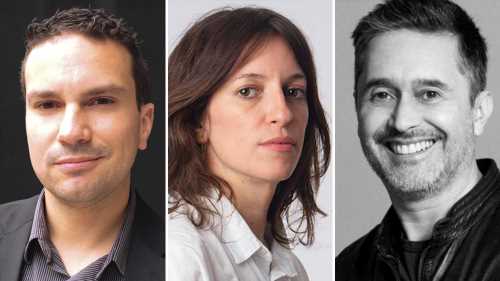Mexico’s Katina Medina Mora, director of Netflix hits ‘Emily in Paris’ and ‘Firefly Lane’ and Apple TV+ standout “Swagger,” is teaming with Chile’s Julio Rojas, creator of podcast phenom “Caso 63,” to direct and co-write with Rojas “Freeland.”
Medina Mora, Rojas and “Freeland” producer Nestor Hernández, a former Sony and HBO development exec for Latin America, will attend the San Sebastian Film Festival, which kicks off on Sept. 22, to present the project.
Longtime MadAvenue PR director Eva Herrero will also serve as an executive producer on the film.
One of the most ambitious movies now in the works from Latin America and Spain, “Freeland” is set in America’s Midwest, and combines a teen first love romantic drama, a building thriller propulsion and the kind of anticipatory near future science fiction for which Rojas is hailed as a master.
Sparking a successful U.S. podcast remake starring Julianne Moore and Oscar Isaac, Rojas’ “Caso 63,” just commissioned for a second season and one of the most popular audio series in the world, features a psychiatric patient who claims to be a time traveller from 2063, arriving in 2022 to save the world from a much more lethal COVID variant than the 2020 pandemic.
In “Freeland,” which is based on Rojas’ same-titled novel, Nicolas, 17, is living an idyllic life in a village, part of a loving family, who presents at school his project, in which he presents a globe, proclaiming the earth is round.
To his stupor, the school authorities are concerned and Nicolas and the audience discover that he is living in a totalitarian dystopia where, in the mid-2030s, a creationist revolution re-wrote history.
Nicolas is packed off to a five-week reeducation reformatory, Hotel Roma, where he falls head-in-heels in love with Hipatia, the daughter of political prisoners. Together, they plan their escape to Freeland’s border.
The partners aim to shoot “Freeland” in English. “Since this dystopia has to be global, this sensation of globality comes more naturally in an English-language universe, and the film has a lot to do with creationism and flatworldism, so its natural location is there,” Rojas noted.
English also opens the door to working with casts like that of “Silent Night” and might mean bringing in a U.S. or U.K. screenwriter, Hernández added.
“Freeland” has multiple attractions, the partners argue, such as the meshing of a coming of age narrative framing a rebellion against a world’s regression in belief, which has obvious resonance in the contemporary world.
“Everybody is educated by religions or rules and it’s important and marvellous to be able to tell the story of an adolescent who feels an intrinsic curiosity to discover and question the world and finds people who want to make the same questions,” Medina Mora observed.
“There are so many things that we took for granted, on the level of basic rights and certainties which now negationists reject, such as COVID-19, while people claim that homosexuality should be repressed. 10-15 years ago, these claims would have been ridiculous, and now they’re being made by our neighbors or brothers and sisters-in-law,” Hernández observed.
“The film offers fantastic opportunities in visuals,” said Medina Mora, noting that village scenes would use more controlled camera movement, symmetrical framing and non-clashing tones.
Set ups at Hotel Roma will be more chaotic and lighting darker.
That said, unlike other near future narratives such as “The Handmaid’s Tale,” in Freeland, “there won’t be a sense that this is science fiction and could never happen,” said Medina Mora. “We want to maintain a sense of reality, and center ‘Freeland’ on its characters,” she added, citing Mark Romanek’s “Never Let Me Go.”
At San Sebastian, the trio will talk with potential European co-production partners, said Medina Mora, which does not exclude the possibility of working with a U.S. studio, Hernández added.
Before working on titles of global renown, Rojas and Medina Mora both originated on the Latin American independent scene, making largely relationship movies, Medina Mora directing 2013’s “LuTo” and 2015’s “You Will Know What to Do With Me,” which marked her out as a talent to track.
A writer on Lucía Puenzo’s “La Jauría” and Pablo Fendrik’s “El Refugio,” hailed as Latin America’s first major premium sci-fi TV series, Rojas wrote four screenplays for Matías Bize, including “The Life of Fish,” selected by Variety in 2020 as one of the 10 best foreign films in the last decade still without U.S. distribution.
Hernández’s fertile time at HBO Latin America saw him overview development Colombian horror survival actioner “Thousand Fangs,” and Fendrik’s “The Bronze Garden” and “Amongst Men,” the most acclaimed of 2021’s Berlinale Series, and all with a nuanced sense of genre.
Read More About:
Source: Read Full Article

